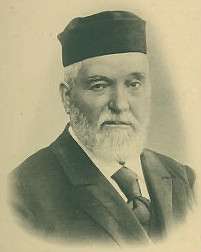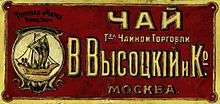Wissotzky Tea
 | |
Native name | תה ויסוצקי |
|---|---|
| Tea Company | |
| Founded | Moscow, Russia 1849 |
| Founder | Kalonimus Wolf Wissotzky |
| Headquarters | Tel Aviv, Israel |
| Website |
www |
Wissotzky Tea is an international, family-owned tea company based in Israel with offices in London and the United States. It is the leading tea distributor in Israel. Founded in 1849 in Moscow, Russia, it became the largest tea firm in the Russian Empire. By the early 20th century, it was the largest tea manufacturer in the world.[1] It is one of the oldest tea companies in the world.
The Wissotzky Tea Company is headed by Shalom Seidler, a descendant of Simon Zeidler. The company's headquarters are located in Tel Aviv while production takes place at a state of the art factory located in the Galilee; the company employs about 400 workers.[2]
All of Wissotzky's products are non-GMO, non-staple, processed and packaged by automated machinery, meeting international ISO 22000, HACCP and GMP.
The company enjoys a 76% hold in the local market and exports its products worldwide. Wissotzky Tea is distributed worldwide in Canada, UK, Australia, Japan and South Korea, Europe, Hungary, Russia, Ukraine and the US kosher market, entering the United States mass market with its launch of The Signature Collection; a collection of silky pyramid sachets containing whole loose leaf tea, fruits and herbs.
History
19th century

In 1885, Zeev Kalonymus Wissotzky, visited Palestine. In that year, Wissotzky, who founded the tea company carrying his name in 1849, was already a wealthy and influential man, and was called "the Russian king of tea".
He had become a prominent figure in the Hovevei Zion movement and was part of the leadership of the Bilu movement, founded in 1882. In 1885 the movement sent him to Palestine following an argument with the heads of the Jewish Yishuv, regarding the use of funds sent to the Holy Land from the Jewish diaspora. Hovevei Zion thought the money should be spent on founding new Jewish colonies, while the heads of the Yishuv, naturally disagreed. Wissotzky was given the role of touring the land in order to find a way of solving the debate, while keeping everyone happy.
Wissotzky Tea soon gained devoted customers all over the Russian Empire.
20th century
1900–1919

By 1904 the company extended its activities to Germany, France, New York and Canada. In 1907 Wissotzky established the Anglo-Asiatic company with its head offices in London, managed by Ahad Ha'am, a renowned Jewish writer and philosopher.[3] He had joined the company in 1903 on his resignation as editor of Ha-Shiloach, a Zionist journal.[4] The company acquired plantations in both India and Ceylon (present Sri Lanka).
From the early 1900s through 1917, Wissotzky Tea Company was the largest tea company in the world.[5] Following the Bolshevik Revolution, in 1917 all private businesses in the Russian empire were immediately nationalized by the government, yet it took two more years to complete the takeover of Wissotzky Tea. This is mostly due to the social benefits provided by the company to their many employees.
In 1917 the company gradually ceased its operations in Russia, and the Wissotzky family emigrated to the U.S and Europe, opening branches in Italy, Danzig, Poland, and additional European countries.
During the Russian Revolution, an anti-Semitic ditty mentioning Wissotzky tea made the rounds of Russian society, spreading the idea that Russia was the victim of Jewish domination: "Tea of Wissotzky, Sugar of Brodsky, and Russia of Trotsky."
1920–1939
In the years following the Russian Revolution, Wissotzky Tea Company activities centered in London as its headquarters where it was managed by Boris Lourie and in Danzig, Poland. The operation in Danzig was run by Alexander Chmerling and Solomon Seidler, a tea specialist and scion of the Wissotzky family. Due to the vast emigration from Russia, the Polish facility catered to the demand for the tea they were accustomed to back home.
In 1936 Simon Seidler, the son of Solomon Seidler, sensed the impending danger of the war and left Poland for Palestine. In the following years, many of the family perished in the Holocaust and the company lost its holdings in Europe.
In 1936 Simon Seidler established a Wissotzky hub in the Middle East.[6] Seidler began selling tea to British soldiers stationed in Palestine, thereby promoting the brand name. Simon built a packing facility and gradually expanded the company's range of products. In 1957 Simon Seidler died and his wife Ida Seidler took over the family's tea business. Ida introduced a modern approach to manufacturing and marketing of the brand.
1940–1999
In 1945, Boris Lourie married Anna Wissotzky, and they had two sons, Serge Lourie (born 1946) and Michael Lourie (born 1948). The family holding company, Anglo-Asiatic Ltd, ceased to exist after the death of Boris Lourie, in a car crash, in 1950.
21st century
Wissotzky Tea Company acquired Zeta Olive Oil, a leading olive oil company in the Galilee and Lahmi, a leading home baked goods company in Israel with an international brand named Elsastory.[7][8]
In December 2012 the three companies formed the Wissotzky Group, a gourmet and delicacies conglomerate.
Cultural references
"Visotskis Tey" is the title of a klezmer song by Josh Waletzky, based on a Sholem Aleichem story about a mother who peddles Wissotzky's tea to earn money to buy the freedom of her son who had been drafted into the czar's army.[9][10]
See also
References
- ↑ Merchants to Multinationals: British Trading Companies in the Nineteenth and Twentieth Centuries, Geoffrey Jones, Oxford University Press, 2000
- ↑ About Wissotzky
- ↑ Achad Ha'am (Asher Ginsberg) and Cultural Zionism
- ↑ Who's who in Jewish history. Routledge. ISBN 0-415-26030-2.
- ↑ The House of Dodwell:a century of achievement, 1858-1958
- ↑ 1824 - A man whose name makes Israelis think of 'Tea' is born
- ↑ https://www.haaretz.com/israel-news/business/.premium-that-israeli-olive-oil-you-buy-may-have-its-roots-in-spain-1.5377665
- ↑ https://www.elsastory.com/about
- ↑ Link to list of recordings
- ↑ Dance Fever at Sutton Place Synagogue
External links
- Wissotzky Official Website (Hebrew)
- Wissotzky Tea International Website (English)
- Leah Koenig, Wissotzky Tea Company
- Tea's Success in Israel
- The Central Zionist Archives
- The YIVO Encyclopedia of Jews in Eastern Europe